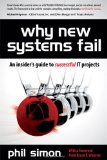Here is an article that zooms right into the reasons for why ERP implementations fail:
Causes of ERP Failures
by: Bruce Zhang
ERP is the acronym of Enterprise Resource Planning. Multi-module ERP software integrates business activities across various functional departments, from product planning, parts purchasing, inventory control, product distribution, to order tracking. ERP has transformed the way multi-billion dollar corporations conduct their businesses. Successful implementation of ERP systems could save tens of millions of dollars and increase employee satisfactions, customer satisfactions and sustain competitive advantages in every-changing marketplace. Corporate executives are often perplexed by the stories that how reputable corporations (Hershey Foods) have failed miserably and lost ten of millions of dollars in their ERP endures.
The failures of ERP projects are preventable if we can identify the common causes of the failures regardless the companies and industries that implement them.
An ERP system is the combination of ERP software, the business processes that the ERP transforms, the users of the ERP system, and the computer systems that run the ERP applications. The failures of a ERP project is often the result of the failures in one or more of those four components. The failures in computer systems (hardware and operating systems) are much easier to identify and to fix, so we’ll examine the failures in software implementation, business process and user acceptance.
Failure of ERP Software Implementation
Module-based ERP software is the core of ERP systems. Most ERP projects involve significant amount of customizations. Packaged ERP software modules have built-in functionality that work in a standard and simplified enterprise environment. However, every organization is unique in data requirements and business processes. It is the customizations that transform packaged ERP software into ERP software that meets organizations’ individual business processes and operations. Long and expensive customization efforts often result the pass of release deadline and budget overrun. Customizations may make the software more fragile and harder to maintain when it finally goes to production. Major changes may be required in the later stage of the implementation as a result of incomplete requirements and power struggles within organizations
The integration of ERP systems (http://www.sysoptima.com/erp/erp_integration.php) with the IT infrastructures also challenges ERP project teams. The use of appropriate implementation methodologies can often make or break a ERP project. (http://www.sysoptima.com/erp/implementation_methodologies.php)
Failure of Accommodating Evolution of Business Processes
According to Anthony, R. A, business processes fall into three levels – strategic planning, management control and operational control. Organizations continuously realign their business processes of all levels in response to the ever-changing market environment. Many ERP systems aren’t flexible enough to accommodate evolution of business processes. many ERP system need a major overhaul in every a couple of years.
Failure of User Acceptance
The users of ERP systems are employees of the organizations at all levels. ERP projects usually modify the company’s business processes which create extra workload for employees who use them initially. They may not think that the workflow embedded in the software are better than the ones they currently use. Ongoing end-user involvement and training may ease the difficult in organization’s adaptation of new systems and new business processes.
About The Author
Bruce Zhang has over 10 years experiences in developing and implementing ecommerce and ebusiness systems in various industries.
He operates a website http://www.sysoptima.com that automatically aggregates the news and new articles in e-business (ERP, CRM,
Supply Chain Management and Knowledge Management) from over 50 sources daily (http://www.sysoptima.com/newsbot/) to help corporate executives, professionals and consultants to keep up with the latest development in enterprise software market. The website offers a knowledge base for understanding business software from a systems perspective.
